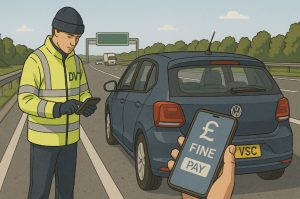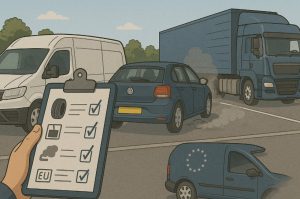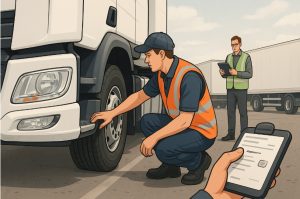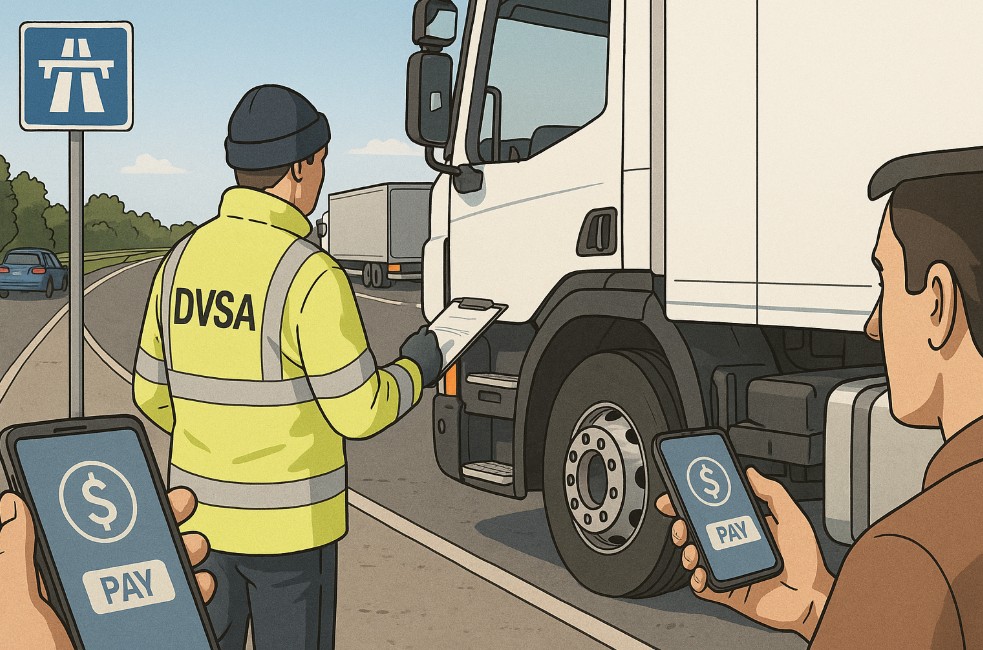Table of Contents
ToggleAre you prepared for the latest changes to how roadside fines are paid in the UK? Do you know that from 28 May 2025, the DVSA has implemented a major overhaul to its roadside fine system, introducing mobile-based payment options that impact both private motorists and commercial drivers?
This update is not a minor tweak. It marks a significant shift in how the Driver and Vehicle Standards Agency (DVSA) enforces road compliance.
With Apple Pay and Google Pay now integrated into roadside enforcement procedures, and with the DVSA switching to a new payment provider, the payment experience for drivers is intended to be quicker, more convenient, and far more efficient.
This guide walks you through the changes in full detail from what offences are affected to how drivers and fleet managers can avoid immobilisation and court proceedings under the new framework.
What Has the DVSA Changed in 2025 Regarding Roadside Fines?

As of 28 May 2025, the DVSA officially transitioned to a more advanced, mobile-friendly payment system for roadside fines. The update reflects the agency’s move toward digital transformation in transport enforcement, aiming to eliminate delays, confusion, and administrative errors that previously plagued the old system.
The DVSA now enables drivers to pay fines using Apple Pay and Google Pay, in addition to standard debit and credit cards. This new system is particularly targeted at those receiving Fixed Penalty Notices (FPNs) at the roadside and is available to both UK and foreign drivers operating in Britain.
The user interface has also been updated. Although the payment page looks different, the process remains familiar and user-friendly, especially for drivers using mobile phones. A payment code is sent via SMS and email, linking directly to a secure payment page where fines can be settled instantly.
Who Is Affected by the New DVSA Payment Rules?
These changes apply to millions of drivers in the UK, particularly those involved in commercial operations. HGV (Heavy Goods Vehicle) and PSV (Public Service Vehicle) drivers are most impacted, as roadside inspections for these vehicle classes are routine and more thorough.
Foreign operators driving in the UK must also comply. The DVSA applies the same enforcement rules to vehicles from outside the UK, and failure to pay fines on the spot may result in vehicle immobilisation or the requirement of a court deposit.
Moreover, businesses and fleet managers need to reassess their compliance protocols. A failure to act on these updates could result in mounting fines, loss of operating licences, and increased scrutiny from enforcement officers.
What Types of Offences Are Fined and Paid Under the New System?

The DVSA issues Fixed Penalty Notices for a variety of offences related to driver conduct, vehicle condition, and transport operations. The fines are typically issued during roadside inspections, and can cover minor administrative oversights to serious breaches of safety and legal compliance.
These offences include, but are not limited to:
- Driver Hours and Tachograph Offences: Exceeding driving limits, not taking mandatory breaks, tampering with tachographs, or failing to produce proper records.
- Vehicle Roadworthiness Issues: Faulty brakes, lights, tyres, suspension systems, and dangerous loading or overloading.
- Documentation and Licencing Errors: No valid MOT certificate, insurance, operator’s licence, or appropriate driver licence classification.
- Weight and Load Breaches: Overloading, unbalanced axles, and incorrect or unsafe load securing.
- Environmental Infractions: Emissions manipulation such as DPF removal or using AdBlue cheat devices.
- Driver Conduct and Safety Issues: Use of a mobile phone while driving, failure to wear a seatbelt, and excessive noise or emissions from a vehicle.
How Does the New DVSA Fine Payment System Work?
Under the updated system, the payment process has been digitised and optimised for mobile access. Here’s how it now works:
- A DVSA officer carries out a roadside inspection and identifies any infringements.
- If a violation is confirmed, the officer issues a fine using a digital device.
- The driver receives a payment code via SMS and email with a secure payment link.
- The fine can be paid immediately using Apple Pay, Google Pay, or standard card methods.
- A digital receipt is generated and sent to the driver for records.
The aim is to reduce paperwork, speed up enforcement, and allow officers to cover more checks during their shifts.
| Payment Method | Availability | Ease of Use | Receipt Provided | Notes |
| Debit/Credit Card | Yes | High | Yes | Interface has a new layout |
| Apple Pay | Yes | Very High | Yes | Fastest option via mobile |
| Google Pay | Yes | Very High | Yes | Instantly with Android devices |
| Cash | No | N/A | N/A | No longer supported at the roadside |
What Are the Consequences of Failing to Pay a DVSA Fine?
Failure to pay a DVSA-issued fine within the stipulated timeframe can lead to escalating consequences. The system is designed to prompt timely payments and resolve infractions quickly.
Consequences include:
- Vehicle Immobilisation: In cases of non-payment, the DVSA may clamp or detain the vehicle at the roadside.
- Additional Charges: Delayed payments may attract administrative fees or deposits.
- Court Proceedings: More severe or repeated offences can be escalated to court.
- Licence Implications: Repeated non-compliance can impact the driver’s or operator’s licence status.
If multiple infractions are detected, multiple fines may be issued simultaneously, significantly increasing the total amount due.
What Do These Changes Mean for Commercial Drivers and Operators?

Commercial drivers, particularly those in the haulage and passenger transport industries, must now treat roadside fines as immediate and non-negotiable unless disputed through formal channels. The instant payment model is designed to prevent unnecessary vehicle delays.
Operators must ensure that:
- Drivers are fully trained in using the new system
- Compliance audits are conducted regularly
- Telematics systems are optimised for monitoring legal driving hours and load management
Operator compliance risk scores, tracked by DVSA, may be affected by the frequency and severity of fines issued to their fleet, affecting future inspection frequency and licence status.
Are There Any Financial Impacts Beyond the Fines?
Yes, and this is especially important in the broader context of UK motoring costs in 2025. Alongside these enforcement changes, the UK government has increased Vehicle Excise Duty (VED), affecting many drivers financially.
Drivers with older, fuel-efficient vehicles that were once considered tax-friendly are now facing increases of up to £150 annually. This shift could create added financial strain, especially when combined with rising fuel costs and new DVSA penalties.
According to experts, the total tax burden for an average motorist now includes:
| Cost Type | Average Annual Amount |
| Vehicle Excise Duty | £200–£300+ |
| Fuel Duty & VAT | £524.21 |
| DVSA Fines (estimates) | £100–£500 (per event) |
What Should Drivers and Businesses Do to Stay Compliant?

Staying compliant under the new DVSA rules is not just about avoiding fines, it’s about maintaining road safety and business continuity. All motorists should become familiar with the offences and know what to do during an inspection.
For individual drivers:
- Ensure documents like MOT, insurance, and licence are up to date.
- Conduct daily vehicle checks before driving.
- Understand tachograph rules if driving commercially.
For fleet managers:
- Maintain up-to-date records on all vehicles and drivers.
- Implement ongoing compliance training.
- Use fleet management tools that flag issues proactively.
Ignoring these updates is not an option vehicles can and will be taken off the road immediately if found in serious breach of DVSA regulations.
Frequently Asked Questions
How are drivers notified of a DVSA roadside fine?
A fine notification is delivered via text and email with a secure payment link and due date.
Can I still pay using a debit card?
Yes. Debit and credit card payments are still accepted, although the interface has changed to accommodate the new system.
What if I miss the payment deadline?
You may face immobilisation of your vehicle, additional penalties, or legal proceedings.
Is the new system secure for online payments?
Yes, the DVSA uses encrypted and government-verified systems for secure transactions.
Do these rules apply to foreign drivers as well?
Absolutely. Foreign drivers are also required to pay on-the-spot, or leave a court deposit in serious cases.
Can fines be disputed?
Yes, fines can be formally contested through the DVSA appeal process detailed in the fine notification.
Is there a difference between the rules in England, Scotland, and Wales?
The rules are standardised across the UK, with rollout starting in Scotland and applying nationwide.
READ MORE:




